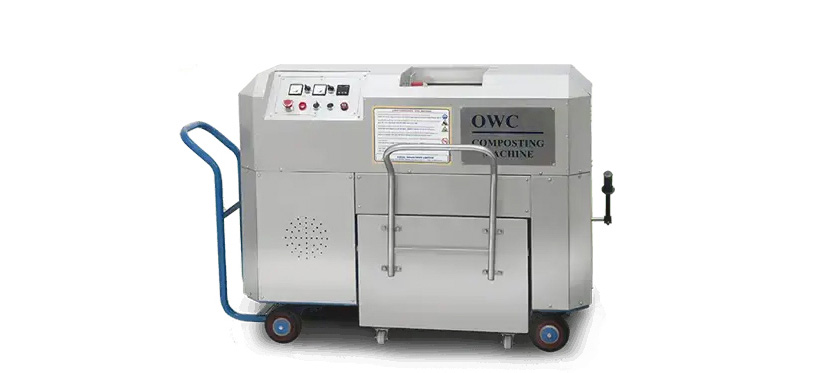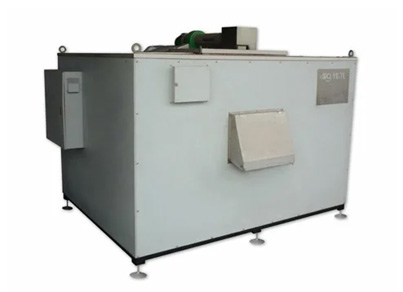
Organic Waste Composters (OWC)
Organic Waste Composters (OWC) are innovative systems that efficiently convert organic waste into nutrient-rich compost through controlled decomposition. These composters utilize aerobic microbial activity to break down organic materials such as food scraps, garden waste, and agricultural residues, transforming them into valuable soil amendments.
OWCs feature insulated chambers with optimal temperature and moisture control, accelerating composting while minimizing odor and greenhouse gas emissions. By diverting organic waste from landfills and incinerators, OWCs mitigate environmental pollution and produce a sustainable resource for enhancing soil fertility and promoting circular economy practices in waste management.
Why chose Agile Venture?
Choose Agile Venture for OWC manufacturing and services for their expertise in innovative composting technology, customizable solutions for various scales, and commitment to sustainability, offering efficient waste diversion and nutrient-rich compost production.
- Cutting-Edge Solutions
- Cost Effective
- Tailored Solutions
- Quality of Services

Innovative Solution
Innovative solution transforms wastewater treatment, enhancing efficiency and sustainability.
100% Quality
Guaranteed excellence, ensuring complete satisfaction with every project undertaken.
24/7 Support
Dedicated support ensures seamless operations, maximizing client satisfaction and success.
OWC System
Efficiently convert organic waste into nutrient-rich compost through controlled decomposition.
Working Process of Water Organic Waste Composter (OWC)
The Organic Waste Composter (OWC) process begins with collecting organic waste materials, such as food scraps and garden waste, deposited into the composter unit. Within the OWC, controlled aerobic decomposition occurs, facilitated by a mix of microorganisms.
These microorganisms break down the organic matter, generating heat as a byproduct. The composter's insulated design helps maintain optimal conditions for microbial activity, including temperature and moisture levels.
Over time, the organic waste transforms into nutrient-rich compost, which can then be utilized as a soil amendment for gardening, landscaping, or agricultural purposes, promoting sustainability and circular waste management practices.
How we help in Water Organic Waste Composter (OWC) requirement
We provide comprehensive services for client requirements in Organic Waste Composter (OWC) selection. Our process begins with detailed consultations to understand specific needs and constraints.
We offer a range of OWC models with varying capacities and technologies, ensuring suitability for diverse applications. Our team guides clients through technology selection, considering space availability, waste volume, and desired compost quality.
We provide installation support and training on OWC operation and maintenance. Additionally, we offer ongoing assistance, ensuring seamless integration and optimal performance to meet clients' waste management goals efficiently and sustainably.
Organic Waste Composters (OWC) employ various technologies to convert organic waste into compost efficiently. Some types include:
- 1. Aerated Static Pile Composting: Utilizes perforated pipes or aeration systems to introduce oxygen into the compost pile, promoting aerobic decomposition and accelerating the process.
- 2. In-Vessel Composting: Organic waste is contained within sealed vessels or rotating drums, allowing for controlled decomposition under optimized conditions, such as temperature, moisture, and aeration.
- 3.Vermicomposting utilizes: Vermicomposting utilizes earthworms to break down organic waste, enhance decomposition, and produce nutrient-rich vermicompost, known for its high microbial activity and soil conditioning properties.
- 4. Bokashi composting: Bokashi composting fertilizers organic waste using beneficial microorganisms, typically in an anaerobic environment. This results in a pre-compost material that can be further composted or buried in soil.
- 5. Windrow Composting: Involves arranging organic waste in long, narrow piles or windrows, periodically turning or aerating the material to facilitate decomposition and microbial activity.
Each technology offers unique benefits and is suited to different scales, waste types, and operational preferences, providing versatile options for organic waste management.
Frequently Asked Questions (FAQ)
What is the capacity of your Organic Waste Composter (OWC) units, and how much organic waste can they process per day?
Our Organic Waste Composter (OWC) units come in various capacities, ranging from small-scale to industrial sizes. Depending on the model, our OWC units can process anywhere from 50 kilograms to several tons of organic waste per day, providing scalable solutions for different waste management needs.
Are your OWC systems suitable for both indoor and outdoor use?
Yes, our OWC systems are designed to be versatile and can be used both indoors and outdoors. They are equipped with features like odor control and weatherproofing to ensure effective and efficient composting regardless of the environment, offering flexibility in waste management solutions for various settings.
How does your OWC handle odor control during the composting process?
Our OWC employs a multi-stage odor control system, including bio-filters and activated carbon filters, to effectively neutralize odors emitted during composting. This ensures a pleasant environment for both indoor and outdoor settings, maintaining hygiene standards while efficiently processing organic waste into compost.
Can your OWC accommodate different types of organic waste, such as food scraps, garden waste, and paper products?
Yes, our OWC is designed to accommodate a wide range of organic waste types, including food scraps, garden waste, paper products, and more. Its versatile design and adjustable settings allow for efficient processing of various organic materials, offering comprehensive waste management solutions for diverse needs.
What is the energy consumption of your OWC units, and are they environmentally friendly?
Our OWC units are engineered to be energy-efficient, utilizing advanced composting technologies to minimize energy consumption. Additionally, they promote environmental sustainability by diverting organic waste from landfills, reducing methane emissions, and producing nutrient-rich compost for soil enrichment, aligning with eco-friendly waste management practices.
Are there any specific installation requirements for your OWC systems, such as space or ventilation needs?
Our OWC systems require minimal installation, needing only a flat surface and access to electricity. Ventilation is integrated into the design, ensuring proper airflow for the composting process. While space requirements vary based on model size, our team guides to optimize installation for efficient operation.
How do your OWC units compare in terms of cost-effectiveness to other waste management solutions, such as landfill disposal or incineration?
Our OWC units offer superior cost-effectiveness compared to traditional waste management methods like landfill disposal or incineration. By converting organic waste into compost, they reduce waste disposal fees and mitigate environmental impact, providing long-term savings while promoting sustainability and resource conservation.
What safety and performance certifications or standards do your OWC units comply with?
Our OWC units adhere to stringent safety and performance standards, including ISO 9001 and ISO 14001 certifications. They also comply with relevant industry regulations, such as CE and UL certifications, ensuring high-quality construction, operational safety, and environmental responsibility and providing peace of mind to our clients.
Do you offer customization options for your OWC systems to meet specific client needs or waste management challenges?
Yes, we offer customization options for our OWC systems to suit specific client requirements and waste management challenges. Our experienced team collaborates closely with clients to understand their needs and develop bespoke solutions, ensuring optimal performance and efficiency in composting organic waste.
What technical support and after-sales services do you provide for your OWC units?
We provide comprehensive technical support and after-sales services for our OWC units, including installation assistance, operator training, and maintenance programs. Our dedicated support team is available to address any inquiries or issues promptly, ensuring smooth operation and maximum efficiency throughout the lifespan of the composting system.
Get in Touch
Connect with us today for tailored solutions, exceptional service, and transformative results for your wastewater needs.
Call us on
+91-8882354793
Email us
contact@agileventures.in
